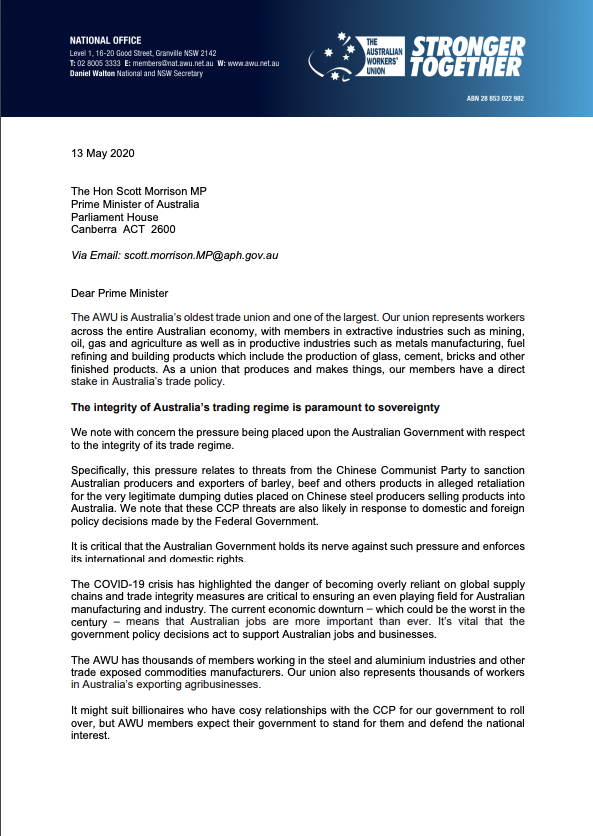
DANIEL WALTON
DANIEL Walton is the NSW and Nation Secretary of the Australian Workers Union who recently upstaged Labor leader Anthony Albanese with his union’s stance on China. A copy of Walton’s public letter regarding China’s aggressive stance against Australia is below:

Dear Prime Minister
The AWU is Australia’s oldest trade union and one of the largest. Our union represents workers across the entire Australian economy, with members in extractive industries such as mining, oil, gas and agriculture as well as in productive industries such as metals manufacturing, fuel refining and building products which include the production of glass, cement, bricks and other finished products. As a union that produces and makes things, our members have a direct stake in Australia’s trade policy.
The integrity of Australia’s trading regime is paramount to sovereignty
We note with concern the pressure being placed upon the Australian Government with respect to the integrity of its trade regime.
Specifically, this pressure relates to threats from the Chinese Communist Party to sanction Australian producers and exporters of barley, beef and others products in alleged retaliation for the very legitimate dumping duties placed on Chinese steel producers selling products into Australia. We note that these CCP threats are also likely in response to domestic and foreign policy decisions made by the Federal Government.
It is critical that the Australian Government holds its nerve against such pressure and enforces its international and domestic rights.
The COVID-19 crisis has highlighted the danger of becoming overly reliant on global supply chains and trade integrity measures are critical to ensuring an even playing field for Australian manufacturing and industry.
The current economic downturn – which could be the worst in the century – means that Australian jobs are more important than ever. It’s vital that the government policy decisions act to support Australian jobs and businesses.
The AWU has thousands of members working in the steel and aluminium industries and other trade exposed commodities manufacturers. Our union also represents thousands of workers in Australia’s exporting agribusinesses.
It might suit billionaires who have cosy relationships with the CCP for our government to roll over, but AWU members expect their government to stand for them and defend the national interest.
These trade sanctions imposed by China appear to be consistent with threats made by CCP representatives to Australia about the willingness of China to continue to trade with Australia and consume Australian products. It is clear these threats have now been activated.
We note that such ‘tit-for-tat’ trade sanctioning is at best a breach of the established laws and norms of the World Trade Organisation and at worst amounts to an unconscionable form of trade coercion and bullying. These are not the actions of sophisticated nation states that accept global rules of trade or law.
Submitting to the preferred trade arrangement of the Chinese Communist Party – one where high performance in Australian agriculture is punished and cheating in metals manufacturing is rewarded – would be a total inversion of how trade works in a free, fair multilateral system.
A failure to punish cheats – regardless of their threatening behaviour – would not just harm Australia’s steel and aluminium industries. It would set the scene for other industries to be destroyed by an emboldening a trading partner who could dump goods with impunity.
Such a capitulation would undermine Australia’s sovereignty and capacity to act in the national interest.
Free trade must be fair trade
Australia has always engaged with trade rules fairly. It is incumbent upon all nations to engage on this basis. As a trading nation, Australia has a major stake in the acceptance of a rules based trade system with a global and domestic umpire that adjudicates disputes.
China’s global record on trade, particularly on metals manufacturing, is highly questionable and arguably calculated to unfairly benefit China’s economy and its producers. Every steel and aluminium producing nation outside of China has accused Chinese producers of dumping with many jurisdictions imposing hefty dumping duties of their own.
Furthermore, China’s mammoth state-owned steel sector benefits from a complex array of subsidies and incentives which enormously questions the so-called competitiveness of China’s market dominating metals sector. This strategy is designed to preference job creation in China over other nations.
OECD analysis has shown that China is the leading country for dumping in every G20 nation by an overwhelming margin. In 2018, OECD analysis show that 75 per cent of safeguard investigations in these countries involved steel and aluminium from China.
Australia’s evidence-based system
All nations of the world utilise anti-dumping settings to ensure that the integrity of the domestic markets are maintained.
Australia’s anti-dumping system is procedurally fair, WTO compliant and evidence based when assessing cases. These measures are put in place to protect Australian industry and Australian jobs from being destroyed through unfair competition and trade cheating.
Cases are administered by the Anti-Dumping Commission (ADC) in a dispassionate, evidence based fashion.
Australian investigations provide producers with ample opportunity to refute claims of dumping.
Despite this lengthy, thorough process Chinese steel and aluminium producers in particular have been regularly found to be in breach of Australia’s dumping laws.
On this, the numbers do not lie:
- the Anti-Dumping Commission is currently running 31 cases, 17 of which are solely from or include China (55%).
- The Anti-Dumping Commission has filed 288 cases in its existence, 133 of which were solely from China and a further 56 included China. China has been party to 66% of total cases against Australia.
- The overwhelming number of cases involve steel and aluminium.
Despite ideological commentary from organisations such as the Productivity Commission, most fair-minded analysts would agree that Australian trade penalties are at the lower end of the global spectrum for importers found to be engaging in illegal dumping.
Furthermore, it is generally accepted that the ADC is poorly funded and would be better able to fulfil its mandate of stamping out illegal dumping activity with more resourcing. Australia’s dumping laws, while recently improved – also provide China with the benefit of ‘Market Economy’ status, something that no other major trading nation has afforded China.
To suggest Australia treats China unfairly is erroneous and does not survive scrutiny of fact.
Australia’s agricultural sector is world leading
Despite protestations, there is no case to be made against Australia’s highly competitive and world leading barley export industry or indeed other parts of the agricultural sector.
Australia’s agricultural sector is the world’s least subsidised and contrasts favourably with much of world’s agricultural markets – including China’s – which are highly protected.
According to the OECD the following production subsidy percentages for selected agricultural products for China are as follows:
- Wheat – 35.5%
- Maize – 12.57%
- Rice – 26.82%
- Soybeans – 17.68%
- Beef and veal – 13.28%
OECD figures attributed the following production subsidy percentages for selected agricultural products for Australia:
- Wheat – 0%
- Barley – 0%
- Beef and veal – 0%
- Pig meat – 0%
These numbers support the view that trade sanctions imposed by the CCP on Australian agricultural product are political in their nature, designed to injure Australian industry and coerce the government into capitulation.
Global action and coordination – a ‘Trade NATO’
Australia is not alone in the fight for a free and fair-trading system. Examples of Chinese trade coercion and belligerence are too numerous to mention are well documented.
To provide relief to Chinese dumpers of steel, aluminium or other products would be to reward bad behaviour and endorse trade coercion. As a middle power reliant on trade the rules of trade are absolutely critical to Australia.
Australia should resist any attempts to be bullied by its trading partners, be they the People’s Republic of China or anyone else. The integrity and sovereignty of Australia’s domestic economy hinges on its capacity to make decisions based on that national interest and on available evidence.
But to resist these efforts, it is clear Australia should work with like-minded trading partners in a multi-lateral effort to offset China’s preferred approach of bilateral bullying.
The issues of trade are complex and thus require a well understood, supported and enforced rules base. Such a system requires global buy-in and sponsorship from likeminded nations working together to ensure the rules are adhered to. While Australia should continue to provide support to the WTO, it is clear that Australia should form a multilateral partnership with nations that support trading rules.
The AWU regularly works with our sister unions in other countries and would be delighted to assist in the coordination of these efforts on a tri-partite, international basis.
Australia’s trade relationship with China is of extreme importance to both countries and can and should continue to deepen. But this process can only occur if both sides are seen to be even handed and operating in good faith. It is now incumbent upon the Chinese Communist Party to show the Australian people it is such an actor.
Our members look forward to your support for their jobs and hearing from you about the Government’s plans to support Australian industry.
Yours sincerely
Daniel Walton
NATIONAL SECRETARY











WISE WORDS INDEED written by Daniel Walton, National Secretary of the AWU in his letter to our Prime Minister